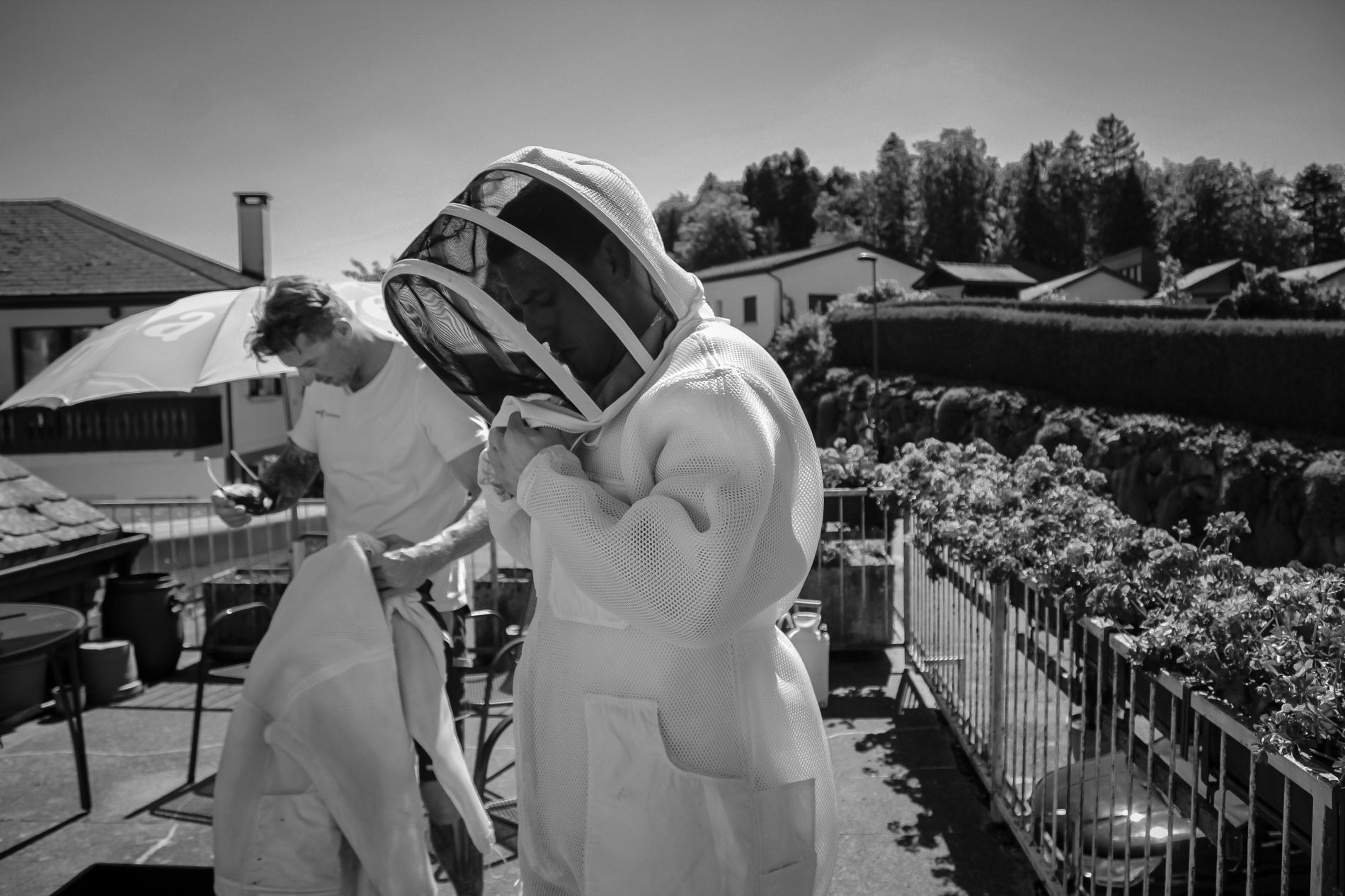
Fighting Asian hornets in Soral
Have you discovered an Asian hornet's nest? We'll be on site quickly! Call now - Daily Mon-Sun 07:00-21:30. Contact us now: 058 510 22 54
Having the Asian hornet's nest removed
Vespa velutina, a type of hornet native to South-East Asia, has aggressively expanded its presence to encompass Switzerland and the entirety of the subcontinent. Although it poses no threat to humans, it is infamous for its honey bee hunting tendencies, causing distress among beekeepers. Just a small number of these hornets can launch an attack that annihilates a bee colony in mere hours. If you have discovered a hornet's nest on your house, patio, shed, or in your blind box, contact our experts for hornet nest removal in Soral!
Use the uncomplicated telephone service of the Hornet experts in Soral and simply inform us at 058 510 22 54, we will be on site quickly so that you and everyone in your area feel completely safe again.
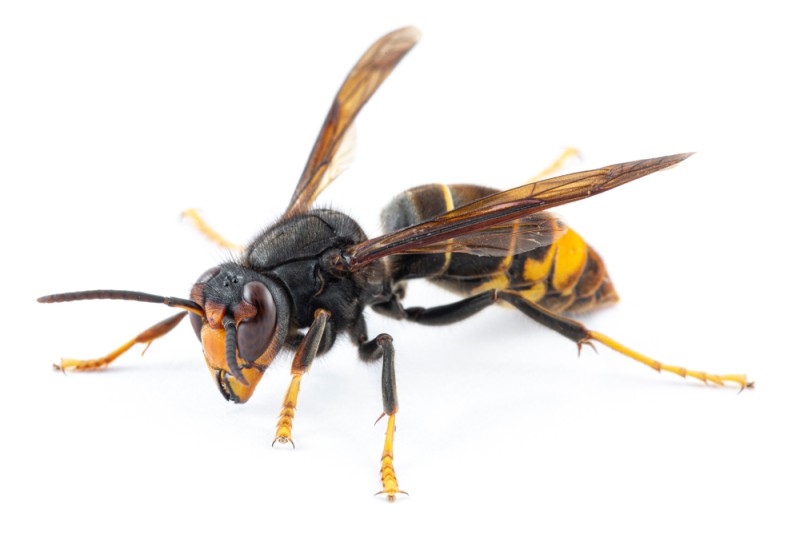

Appearance of the Asian hornet
Here are some characteristics that distinguish the Asian hornet:
1. Size: The queen can reach a length of about 3 cm, while the workers are slightly smaller and measure about 2.5 cm.
2. Color: The Asian hornet has a dark body that is almost black, with a yellow stripe at the back of the abdomen. Its face is orange-yellow.
3. Wings: The wings are dark and almost smoky gray.
4. Legs: The hornet has yellow tips on its legs, which is a striking distinguishing feature when it flies.
5. Nest: The Asian hornet's nest is often high in the trees, but it can also be found underground or in tall structures such as chimneys. It has an oval shape and is made of chewed wood, which gives the hornet a papery texture.
It is important to distinguish the Asian hornet from the European hornet (Vespa crabro), which is more harmless and a natural part of the European fauna. If you suspect you have found an Asian hornet nest near you in Soral, you should report this to the local authorities, or using our reporting form, as they can spread quickly and be harmful to bees and other insects. To avoid being attacked by the flying inhabitants, you should hire a professional pest controller such as the Hornet Experts Soral. We can identify the nest beyond doubt and take further steps to remove the Asian hornets professionally.
News about the Asian hornet in Soral
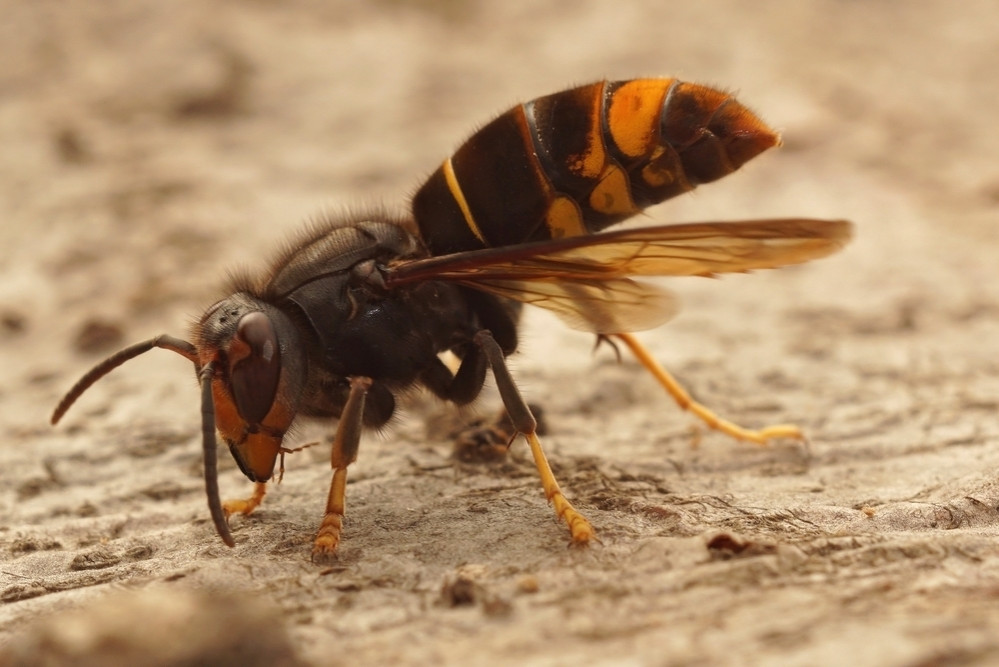
02.12.2025 Western Switzerland: Killer hornet eats bees
The territory of the Asian killer hornet has expanded considerably this year, with a notable increase reported in western Switzerland. This invasive species poses a significant threat to native bee populations, as bees make up the majority of its diet. The potential consequences are serious. Moreover, the hornet represents a danger to individuals with allergies to its venom.
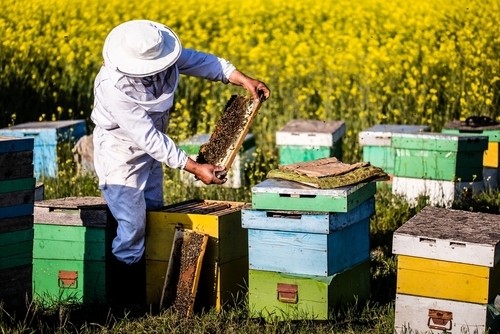
25.11.2025 Serious concerns about the bee population!
Asian hornets are inflicting significant harm on beehives across multiple parts of Europe, as reported by local beekeepers. Even a small number of hornets can destroy an entire bee colony within hours. This sharp decline in pollinators could have serious consequences for pollination, local ecosystems, and agricultural productivity.
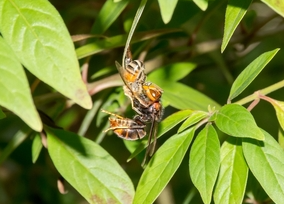
18.11.2025 Asian hornet doesn't just eat bees!
The danger it presents to insects is substantial!
The Asian hornet feeds largely on honeybees—up to 85 percent of its diet—alongside beetles and flies. This high level of predation not only poses difficulties for fruit growers but also further threatens already vulnerable bee populations.
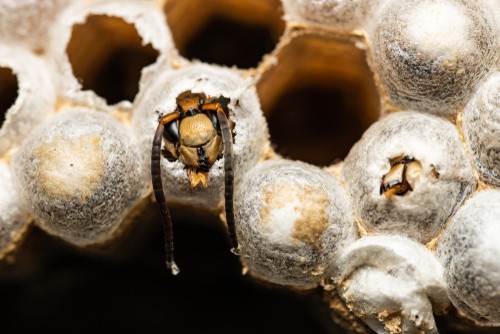
11.11.2025 How did the Asian hornet get to Europe?
The Asian hornet likely arrived in Europe unintentionally and has quickly expanded throughout France and nearby countries. Its adaptability to different environments and the absence of natural predators have contributed to its rapid spread. A single nest can generate several hundred new queens in one breeding season.
Asian Hornet Reporting Form
Please fill out all required fields and submit the form.
Help us!
If you discover an Asian hornet or a nest of this invasive species in Soral, it is of the utmost importance that you report it immediately. The Asian hornet is not only dangerous to humans, but also poses a serious threat to native bee populations and the ecological balance in Switzerland.
Why is it important to report the find?
Once established, the Asian hornet exerts a substantial influence on indigenous insects, particularly honey bees. By targeting bees, it initiates a cascading effect, contributing to a reduction in pollinator numbers and subsequently impacting local floral ecosystems and agricultural output. By reporting sightings, experts can react quickly, remove the hornets or their nests and thus prevent the spread of this invasive species.
Notification form for sightings
To address the issue of the Asian hornet overpopulation in Switzerland and safeguard our native insects, we implore you to utilize our dedicated reporting form to report any suspicions or sightings. With your collaboration, we can intervene promptly and mitigate the expansion of this perilous species in our delicate ecosystems.
Your contribution is crucial in the fight against the Asian hornet in Soral. Together we can protect nature and maintain the balance of our ecosystems;
Thank you for your vigilant attention and your commitment to protecting our environment.
How dangerous is the Asian hornet?
The Asian hornet (Vespa velutina) is a predatory insect that originated in Asia and has spread in recent years to various parts of Europe, including France and now also Switzerland and in Soral. Although it poses a threat to honey bees and native biodiversity, it is generally no more dangerous to humans than other wasp species. Nevertheless, there are some aspects to be aware of:
1. Threat to honey bees: The Asian hornet preys on honey bees, threatening native bee populations. A decline in bees can have a negative impact on pollination and thus on local flora and agricultural production.
2. Stings: As with other wasp and hornet species, the stings of the Asian hornet can also be painful. For most people, the stings are unpleasant but not dangerous. However, people who are allergic to wasp or hornet stings can suffer a severe allergic reaction, which in the worst case can lead to anaphylactic shock.
3. Aggressiveness: Although the Asian hornet is not necessarily more aggressive towards humans than other wasp species, it can become aggressive if it feels threatened, especially near its nest.
4. Ecological effects: Apart from the direct effects on honey bees, the spread of the Asian hornet can also disturb the ecological balance by affecting the populations of other insects.
It is crucial to distinguish the Asian hornet from the Asian giant hornet (*Vespa mandarinia*), also recognized as the "killer hornet". These two species should not be confused as the giant hornet is considerably larger and potentially more hazardous to humans due to its more potent venom and the size of its sting.
If you have discovered a nest, call us immediately: 058 510 22 54
Our hornet professionals in Soral are certified by the VSS.
Frequently Asked Questions About Asian Hornets in Soral
Known for its ability to deliver stings that can cause potentially severe or lethal results, the Asian hornet poses a significantly higher risk than most other hornet species.
Possessing a remarkable build, the Asian hornet is a sizeable stinging insect capable of reaching lengths of up to 3 cm. Its slender, ebony body is decorated with a dense collection of vibrant stripes in orange, yellow, and black.
The Asian hornet is known for its high toxicity to humans. Its bite can be very painful and may elicit allergic reactions.
When it comes to human safety, it is crucial to note the toxicity of the Asian hornet's venom, which can result in painful bites and allergic responses.
A heightened sense of danger surrounds the Asian hornet, primarily attributed to its venomous sting that inflicts more pain in comparison to other wasps and may elicit allergic reactions.
To file a report about an Asian hornet, get in touch with either a regional wild bee protection officer or an agency associated with the responsible Ministry of Agriculture.
Encouraging the reporting of Asian hornets is vital to prevent attacks and limit the spread of this insect. This type of insect is known for being territorial and aggressive.
In Switzerland, addressing the presence of Asian hornets requires professional hornet control services. Contacting a reputable pest control service is advisable to ensure timely intervention.
Despite the absence of protection, closely monitoring the population dynamics of Asian hornets is crucial to prevent their excessive proliferation.
When hibernating, Asian hornets showcase two distinct behaviors: hibernation in a collective state, forming colonies within the corners of walls, buildings, garden sheds, incidental structures, or tree hollows, or hibernation as solitary hornets in those same settings.
Would you like more information about Asian hornets? Then take a look at our FAQ's about Asian hornets.
Private inquiry form
For an uncomplicated request to remove an Asian hornet's nest, please use our contact form for private individuals.
Real estate inquiry form
Use our property management order form to request the removal of an Asian hornet's nest.




_6.jpeg)
_7.jpeg)
_8.jpeg)
_6.jpeg)